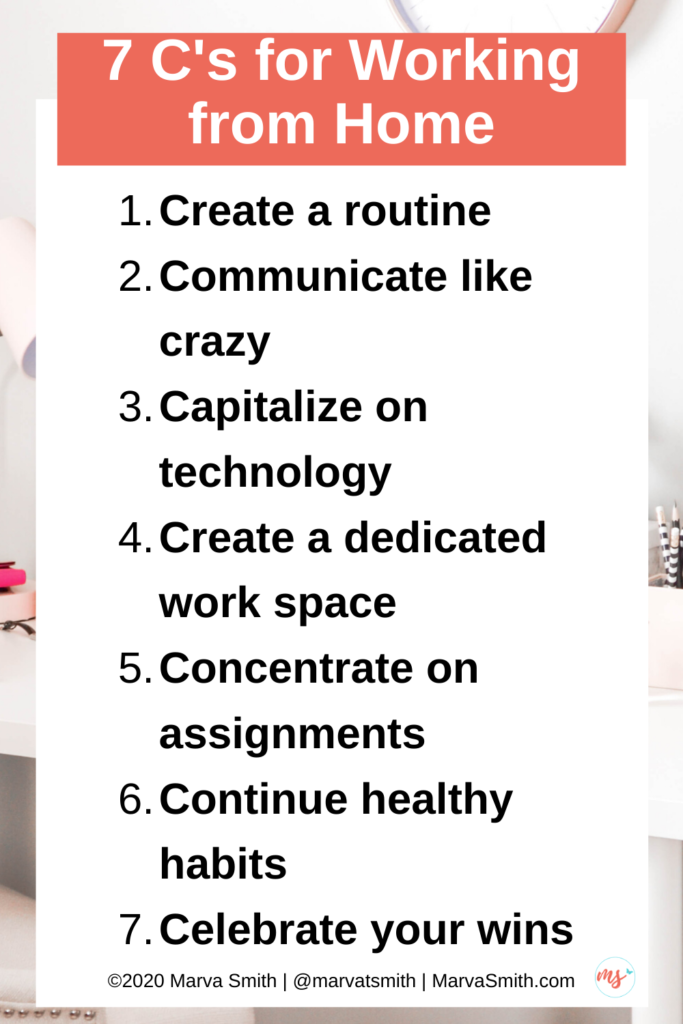The number of persons seeking ways to work from home has been increasing steadily over the last few months and will likely continue to rise. If you’re reading this, you’re probably working from home right now.
This surge has been brought on, in large part, by the current situation that has impacted us the world over. But for some, the work from home transition has been long in the making.
Whatever camp you find yourself in, know that you’re not alone.

Whether you’re working from home for the first time because of the global pandemic or you’ve been doing this for years, there are some nuances that you should be aware of. So, I’ve compiled a set of work from home tips you’ll find useful now and in the future.
I’ve been working from home in various capacities for the past 8 years as a management consultant, leadership trainer, writer and work & life coach. In addition to my tips, you will also find insights and advice from women who’ve been working from home for several years that will help you create your own work from home plan.
Many of these tips are applicable in this season of the COVID-19 pandemic, while many can be applied in any work from home situation. Review the tips, choose the ones that are relevant to you and feel free to make them your own.
7 Tips for Working from Home During COVID-19 (and Beyond)
1. Create a routine
Create a routine that will help you transition in and out of work-mode. For example, you might transition into the workday by starting with your devotions and a morning cup of tea or coffee. Once you’re finished for the day, recap what you’ve accomplished and outline what you will focus on for the next day.

This type of routine signals closure and helps you to move on to other activities such as spending time with family, exercise or other activities to help you wind down.
You might also want to have a schedule for your workday, suggests Tona Haywood. As an online boutique owner who’s been working from home for about 4 years, Tona suggests making a schedule and trying to stick with it as much as possible. “If you don’t make a schedule you will find yourself never taking time out to rest.”
However, the schedule or routine you have at home need not look like the one you had when you were working outside of home. In fact, Petra Molnár, a work from home web designer urges against trying to replicate the workday you had in the office. Because you’re in a new environment with its own challenges, Petra suggests making the best of it and adapting your day to this new reality.
“Expect distractions and plan them into your day. You may think that now as you work from home without your colleagues around you, you can focus on your work better”, but according to Petra, this won’t happen immediately. “Your brain needs time to learn how to focus in this calmer, quieter place” she says.
2. Communicate like crazy
With the recent work from home transition, it’s very likely that you are not doing this solo. And if you’re working as part of a team there are some specific things you’ll want to keep in mind to keep those lines of communication open. Project manager, Christa Hutchins offers these tips for the relational side of working from home when you’re part of a team.
- Give yourself and others plenty of grace, particularly if you’re working from home due to COVID-19, which is new to everyone. Keep in mind that bosses aren’t trying to micro-manage your day, and employees are not trying to get away with anything. Everyone is figuring it out. So, offer grace and believe the best about others.
- Employees: make sure your boss knows what you are doing. If they have not established routine check-ins, touch base with them at the beginning and end of the day to let them know you are at your work station, what you are working on and what you have completed.
- Bosses: if your company policy allows it, agree on specific outcomes and results needed from your salaried team members, rather than a specific number of hours. In many instances, working from home can be more productive, without the hallway conversations, meetings and other distractions. So, your team may very well get more done in less hours.

- Coworkers: check on each other. Phone calls, instant messages or texts can replace the casual hallway conversations that develop connections and trust in an office environment. Maintaining the office social conventions reduces the feelings of isolation that can come when working from home.
- Teams: develop a communication plan that everyone uses consistently. With so many channels for communication (email, instant messaging/chat rooms, texts), things can easily get scattered. In general, email should be used for things requiring a longer explanation. commitments and agreements, and anything where the documentation needs to be preserved. Instant messaging or chat rooms are best for quick questions and “water cooler talk”. Texts should be saved for urgent messages when you think the person may not be at their computer. If your company does not already have an established communication plan, start using your own to keep yourself organized and maybe your co-workers will follow.
3. Capitalize on technology
In order to work from home successfully you’ll need to rely on technology to stay connected, submit your work and yes, improve your productivity. Your company might already have guidelines or recommended services in place, so you’ll want to familiarize yourself with those first.
If you have freedom to choose your own apps and services do your research to find the ones that suit your working style and will boost your productivity. Keep in mind that they may need to be compatible with what your clients and colleagues may be using.
Petra Molnár suggests getting into conversation with others online, learning from them, and being willing to try out new ideas. “Don’t feel discouraged if what may have worked for them, was a disaster for you. The next one may be the unexpected solution.”
Another benefit of using services such as video conferencing apps is that you stave off isolation, which is a very real concern when working from home.
Capitalize on technology like video conferencing apps to help keep isolation at bay when working from home. Share on X4. Create a dedicated work space
Create a dedicated work space with as few distractions as possible.
For Nicki Schroeder a clean desk is important. Having worked from home for more than ten years, Nicki knows what works for her. “If it’s chaotic it feeds my mind with chaos and distractions. When it’s clean – even if it means I have to take all the stuff and put it in a pile on the floor out of eyesight – it helps me stay focused.”
Debi Stangeland who has worked from home for over 13 years agrees that a dedicated workspace is a non-negotiable for her as well. “I need to spread out and a place to walk away from.”

5. Concentrate on assignments
Concentrate on those assignments by setting clear boundaries and making the most of the time you have available for work.
Elisa Pulliam, an author and Christian life coach, has been working from home for 20 years since her oldest was born. According to her, “the most important step in resolving the work-from-home tension is around clear understanding for yourself and those you do life with in regards to your work that is “interruptable.”
If you will be frustrated by an interruption, your best choice is to relocate from common spaces. Setting up mini-office spaces throughout the home can make this relocation possible as schedules change throughout the day.”
Elisa sometimes chooses to work in a common space as a perk for working from home, in which case communication with the rest of the family is paramount. “The better your communication, the clearer your own expectations will be, and the less you’ll be frustrated by the productivity challenges that come from working at home”.
When it comes to using time productively, Debi Stangeland’s position is clear. She sets working hours so that she can get her work done, give herself a sense of urgency and to create balance for her family. One of her secrets to staying productive is music. “I work best to, of all things, Bossa Nova music. I can really rock the productivity if I’ve got the right beats!”
But part of being productive also means knowing when to stop working. Debi sets a timer to keep herself from getting stretched too thin. Otherwise she’d happily work for hours without boundaries, suggesting the importance of striking a balance between work and life.
6. Continue healthy habits
Healthy habits such as proper hydration, occasional breaks and good posture should be maintained when you work from home.

Author Sarah Geringer says she fends off sluggishness by setting a timer every 45 minutes. She then stares out her windows at faraway objects, giving her eyes a much-needed break from the screen –something she’s learned to do over her 13 years working from home.
“I also walk briskly around the house for a few minutes or do some jumping jacks to get my blood flowing. I purchased a walking desk to get some steps in while I’m working, and I spend a half-hour each afternoon on my treadmill while I read books on my Kindle.”
Your healthy habits might look different from Sarah’s but the key is to find what works for you and make it a priority for your own mental and physical wellbeing.
Maintain healthy habits when working from home to help improve your mental and physical wellbeing. Share on X7. Celebrate your wins
As with anything else, working from home means you’ll experience both successes and failures. I love Petra Molnár’s suggestion of giving yourself “permission to fail”. Be okay with making mistakes until you figure out the most suitable workday routine that’s possible under these new circumstances.
But also look for the wins.
Each day, each week, if you look for it, I know you’ll find at least one thing that went right. Doing so will keep you motivated and inspire you to show up for the next day, week or month.
While you might not be able to meet friends for coffee or drinks, you can still plan a virtual happy hour with friends or coworkers at the end of the week. Or maybe your idea of celebrating is sleeping in a little later the next day. Look for your wins, choose how you will celebrate, and make it happen.

BONUS TIP: Find your Community
If there’s one more thing I’d like for you to take away from this article is the fact that you’re not alone. It might feel like a lonely road but there is a growing number of women who are in a similar situation like you. Women who have had to pivot in different situations and adjust when life throws them curve balls. I know because I talk with them regularly in our Free to Thrive Community.
I created the Free to Thrive Community because I felt the need to come alongside women like you to provide support, accountability and community. It might feel like we’re living in unsettled times and that survival is the order of the day. But I’m convinced that together we can do more than just survive, we can thrive!
I’d love to have you join us in this private group, just click here to request to join.
How about you?
Now it’s your turn, which of the above tips have you found most useful? Have you found other ways to work from home that works for you? Feel free to share them in the comments. And don’t forget to join us in the private group for women who want to thrive, no matter how unsettled life might seem.
Contributors
Below is a list of women who generously offered their advice and suggestions for this article. Click on each name to find out more about their work and to connect with them.


How do you stay so up-beat all the time
??????
Hi Esther, truthfully, I’m not upbeat ALL the time. But thankfully God has been working on me and helping me grow in my gratitude and joy. I’m so glad I got to ‘meet’ you recently. Blessings!
Yes, creating a routine is sooooo important and helpful for me right now! Even though the days feel the same, by having that routine I am able to stay in a good mind space.
Natalie, I’m glad you found something that works for you. Some people get really bored with a routine, others thrive on them, and some are somewhere in between. Sometimes we don’t know what helps until we give it a try.
Thanks for stopping by and joining the conversation.